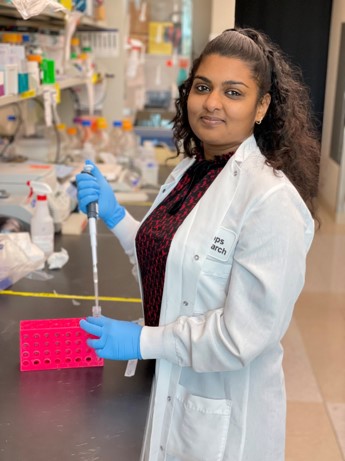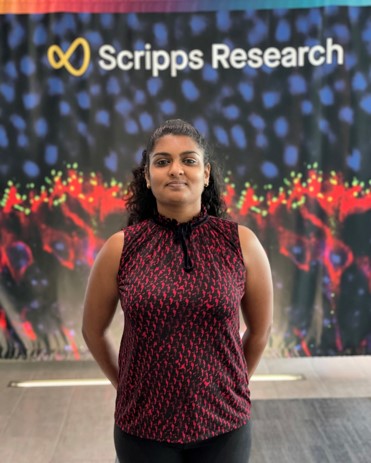 Kerriann Badal, a graduate student in the Integrative Biology PhD program who works in the laboratory of Dr. Sathya Puthanveetil at Scripps Florida, was recently awarded a National Institutes of Health (NIH) F31 Predoctoral Fellowship to Promote Diversity in Health-Related Research for her project titled "The role of bidirectional transport of lysosome-related organelles in learning and memory storage." This NIH F31 initiative seeks to improve the diversity of the health-related research workforce by supporting the training of predoctoral students from groups that have been shown to be underrepresented and provides up to five years of support for research training. Badal joined the Integrative Biology PhD program in fall 2018. She is currently working on her dissertation research in the Sathya Puthanveettil laboratory at Scripps Florida located on Florida Atlantic University’s Jupiter campus. Her research investigates the synaptic regulation of lysosomal-related organelles (LROs) axonal transport in Aplysia californica presynaptic neurons.
Kerriann Badal, a graduate student in the Integrative Biology PhD program who works in the laboratory of Dr. Sathya Puthanveetil at Scripps Florida, was recently awarded a National Institutes of Health (NIH) F31 Predoctoral Fellowship to Promote Diversity in Health-Related Research for her project titled "The role of bidirectional transport of lysosome-related organelles in learning and memory storage." This NIH F31 initiative seeks to improve the diversity of the health-related research workforce by supporting the training of predoctoral students from groups that have been shown to be underrepresented and provides up to five years of support for research training. Badal joined the Integrative Biology PhD program in fall 2018. She is currently working on her dissertation research in the Sathya Puthanveettil laboratory at Scripps Florida located on Florida Atlantic University’s Jupiter campus. Her research investigates the synaptic regulation of lysosomal-related organelles (LROs) axonal transport in Aplysia californica presynaptic neurons.
Project Summary/ Abstract
Axonal transport, the movement of cargoes such as organelles between the cell body and the synapse, is key for transporting signals and cargoes that mediate plasticity. Cargoes that undergo bidirectional axonal transport include mitochondrion, which is essential for providing energy to the cell and maintaining neuronal functions, and lysosome-related organelles (LROs), which are necessary for protein degradation and recycling and neuronal health. Yet, the regulation of organelle transport during synaptic plasticity is poorly understood.
To fill our gap and understand the role and regulation of axonal transport during learning and memory, I will investigate mitochondrial and LROs axonal transport in Aplysia pre-synaptic sensory neurons and post-synaptic L7 motor neuron during excitatory and inhibitory synaptic plasticity and long-term memory. The central hypothesis underlying this proposal is that excitatory plasticity negatively regulates the flux of LRO transport whereas inhibitory plasticity upregulates it in pre- and post-synaptic neurons. I will test my hypothesis with three aims. My first aim will determine whether long-term synaptic facilitation and depression regulates bidirectional transport of LROs in pre- and postsynaptic neurons and, assess the transport dynamics of LROs using photo-switchable Dronpa-Lysosome-20. My second aim will investigate the role of biogenesis of lysosome-related organelle complex 1 subunit-2 (BLOC1S2) in regulating the flux of LRO transport during long-term synaptic facilitation. The third aim will assess the role of ApBLOC1S2 in sensitization of Aplysia.
 Scripps Florida and Florida Atlantic University provide the optimal environment and the necessary resources to accomplish the goals of this proposal and fostering my career development. Moreover, my sponsors are eminent neuroscientists, guidance from Dr. Sathya Puthanveettil will support my project progress and career development. Co-sponsor Dr. Ryohei Yasuda’s imaging expertise will me to develop the technical capabilities to utilize photo-switchable Dronpa-Lysosome-20 plasmid and photo-bleaching techniques to study the LROs anterograde and retrograde transport dynamics as described in aim 1. Cosponsor Dr. Ronald Davis is a leader in the field of learning and memory and will help me develop the skills to rigorously assess my data, interpret my findings, and its application, especially when assessing opposing plasticity-types (excitatory and inhibitory long-term plasticity) in my aim 2. Lastly, cosponsor Dr. Robert Hawkins is a leader in behavioral learning in Aplysia, therefore, his guidance and training will be key for my success in assessing the role of ApBLOC1S2 in learning and memory mentioned in aim 3. My findings will be presented at international conferences such as Max Planck Florida Institute’s Bi-Annual Synapse conference, the Society for Neuroscience meeting, Cold Spring Harbor meetings and Gordon Research Conferences. The aims, trainings, and tools proposed in this grant will help contribute to my goal of becoming a Principal Investigator to study long-term memory storage and add to our knowledge of learning, memory, and neurodegenerative diseases.
Scripps Florida and Florida Atlantic University provide the optimal environment and the necessary resources to accomplish the goals of this proposal and fostering my career development. Moreover, my sponsors are eminent neuroscientists, guidance from Dr. Sathya Puthanveettil will support my project progress and career development. Co-sponsor Dr. Ryohei Yasuda’s imaging expertise will me to develop the technical capabilities to utilize photo-switchable Dronpa-Lysosome-20 plasmid and photo-bleaching techniques to study the LROs anterograde and retrograde transport dynamics as described in aim 1. Cosponsor Dr. Ronald Davis is a leader in the field of learning and memory and will help me develop the skills to rigorously assess my data, interpret my findings, and its application, especially when assessing opposing plasticity-types (excitatory and inhibitory long-term plasticity) in my aim 2. Lastly, cosponsor Dr. Robert Hawkins is a leader in behavioral learning in Aplysia, therefore, his guidance and training will be key for my success in assessing the role of ApBLOC1S2 in learning and memory mentioned in aim 3. My findings will be presented at international conferences such as Max Planck Florida Institute’s Bi-Annual Synapse conference, the Society for Neuroscience meeting, Cold Spring Harbor meetings and Gordon Research Conferences. The aims, trainings, and tools proposed in this grant will help contribute to my goal of becoming a Principal Investigator to study long-term memory storage and add to our knowledge of learning, memory, and neurodegenerative diseases.
Public Health Relevance Statement
Learning and memory are one of the most essential actions for life, thus revealing their components could lead to ways to protect it from neurodegeneration and expand its efficiency. Lysosome-related organelles are acidic, membrane-bound organelles that are involved in digesting macromolecules and are transported bidirectionally along the axon in neurons. It is unclear whether the transport of these organelles is regulated during learning and memory, thus this proposal aims to reveal the role and regulation of lysosome-related organelles transport during excitatory and inhibitory synaptic plasticity in Aplysia californica.